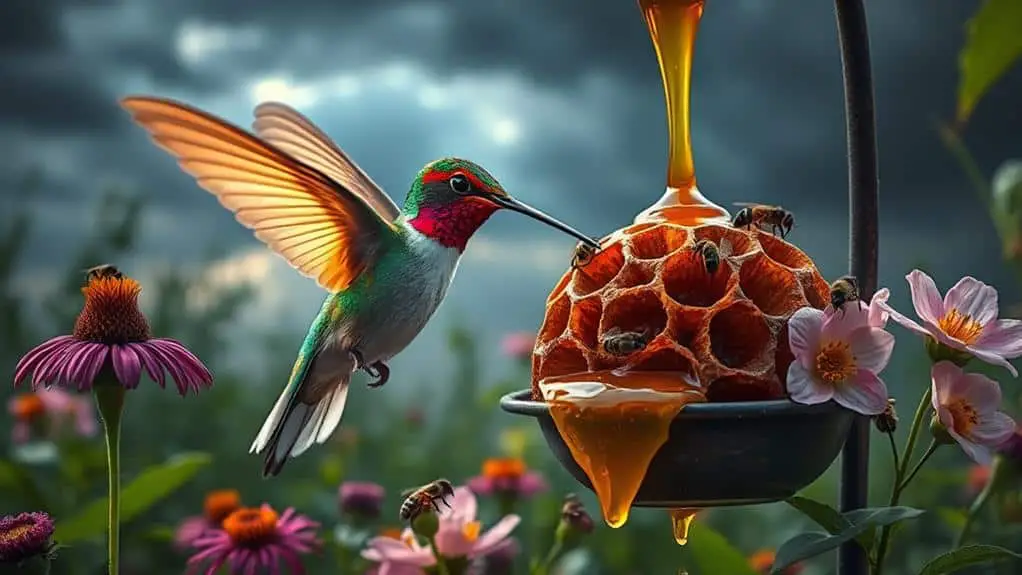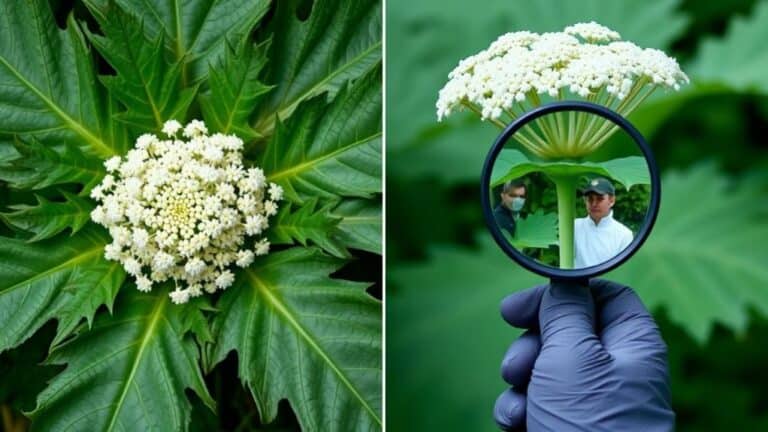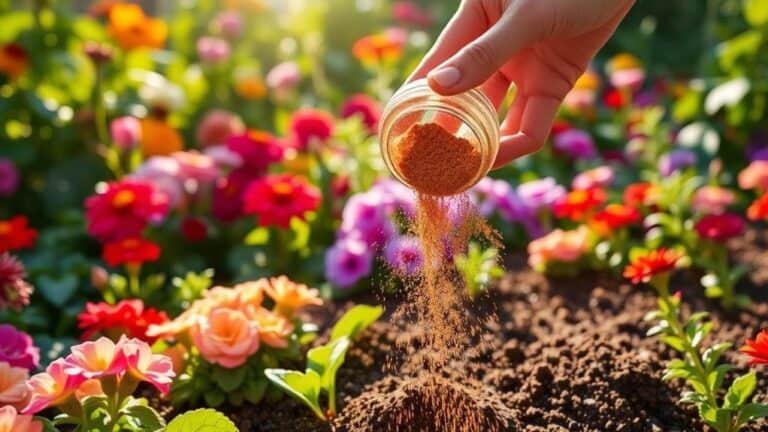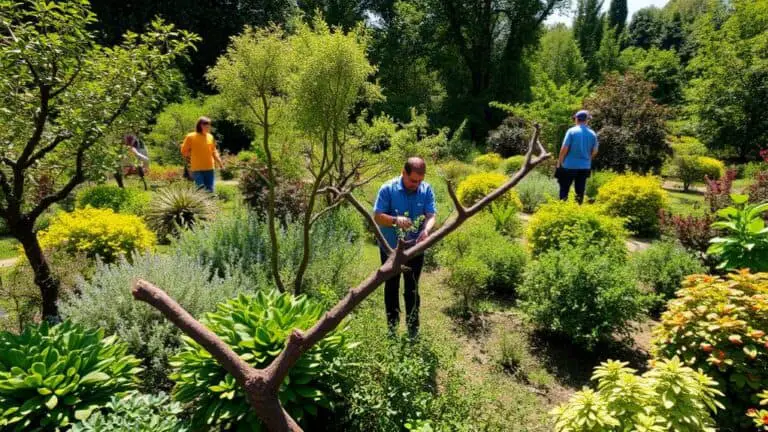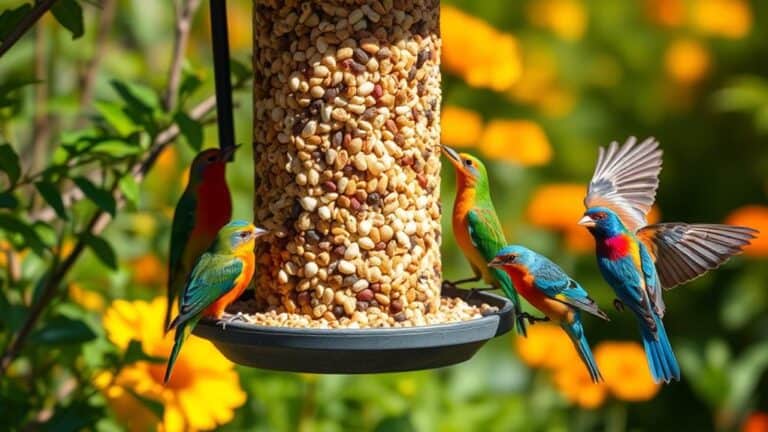Why You Should Never Use Honey In Hummingbird Feeders
I've noticed a common misconception among many bird enthusiasts: using honey in hummingbird feeders. While it might seem like a natural and beneficial choice, honey can actually pose significant health risks to these delicate creatures. The issue isn't just about nutritional deficiencies; honey can harbor harmful bacteria and fungi that are detrimental to hummingbirds. If you're curious about the specific dangers and what alternatives are safer, you'll find the following points particularly eye-opening.
Honey's Hidden Dangers
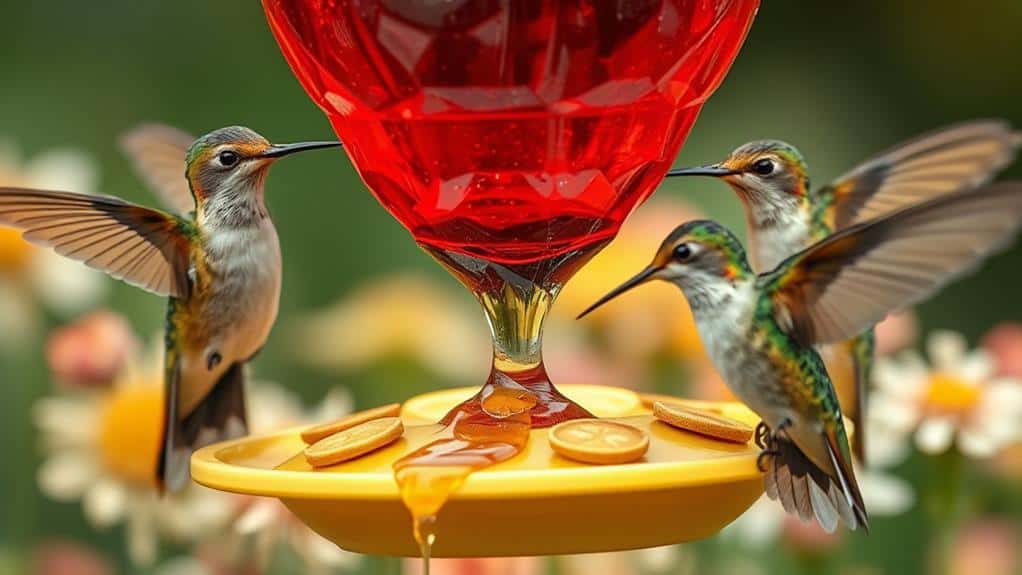
When it comes to feeding hummingbirds, honey's hidden dangers can't be overlooked. Honey can harbor harmful bacteria and fungi, which may lead to fatal infections in these tiny birds.
Despite honey's natural antibiotics, it doesn't offer enough protection against these dangerous pathogens. Hummingbirds thrive on nectar from flowers, which is high in energy and low in contaminants.
Feeding them honey disrupts their natural behaviors and fails to meet their high-energy diet needs. The incorrect sugar-to-water ratio in honey can harm their health.
Using honey in feeders can result in widespread mortality in local hummingbird populations. Let's guarantee our feathered friends stay safe by sticking to their natural nectar sources.
Bacterial Contamination Risks
When we use honey in hummingbird feeders, we risk exposing these tiny birds to harmful bacteria and fungi.
The natural sugars in honey can ferment quickly, which creates a breeding ground for dangerous microbes. This can lead to serious health complications, including a fatal fungal infection called aspergillosis.
Harmful Bacteria Growth
It's important to understand that honey can harbor harmful bacteria, posing significant health risks to hummingbirds.
When you use honey in hummingbird feeders, the natural sugars and moisture in honey create a perfect environment for bacteria to thrive. This can lead to fatal infections for these delicate birds.
Unlike sugar water solutions, honey doesn't provide the immediate energy that hummingbirds need. Instead, it can cause serious digestive issues, disrupting their natural feeding behavior and overall health.
Experts consistently advise against using honey in feeders to avoid bacterial contamination. By sticking to homemade sugar water, you can guarantee your hummingbird friends stay healthy and safe.
Fungal Infection Risk
Although honey might seem like a natural and harmless option, it can actually harbor harmful fungi that pose significant health risks to hummingbirds.
When honey is exposed to varying temperatures and humidity, it becomes a breeding ground for fungal growth. These fungi can infect hummingbirds, leading to serious and often fatal consequences.
Hummingbirds are particularly sensitive to contaminants, and the presence of these fungi can severely impact their health. This makes honey a dangerous choice for feeding.
Instead, using a simple sugar-water solution is much safer. It provides the needed high-energy diet and doesn't carry the same risks. By sticking to sugar water, you're ensuring that your feathered friends stay healthy and vibrant in your garden.
Health Complications Ensue
Beyond the risk of fungal infections, honey also poses a serious threat due to bacterial contamination. Honey can harbor harmful bacteria like Clostridium botulinum, which can cause severe infections in hummingbirds. These tiny creatures have delicate digestive systems, and bacterial contamination can lead to fatal health issues. Experts recommend sticking to sugar water for feeders because it provides the necessary high-energy nutrition.
Here's a quick comparison:
| Aspect | Honey | Sugar Water |
|---|---|---|
| Bacterial Contamination | High risk (Clostridium botulinum) | Low risk |
| Nutritional Value | Inadequate for high metabolism | High-energy nutrition |
| Viscosity | Can cause digestive issues | Easily digestible |
| Expert Recommendation | Strongly advised against | Strongly recommended |
Stick to sugar water to keep your hummingbirds healthy and happy!
Fungal Growth Hazards
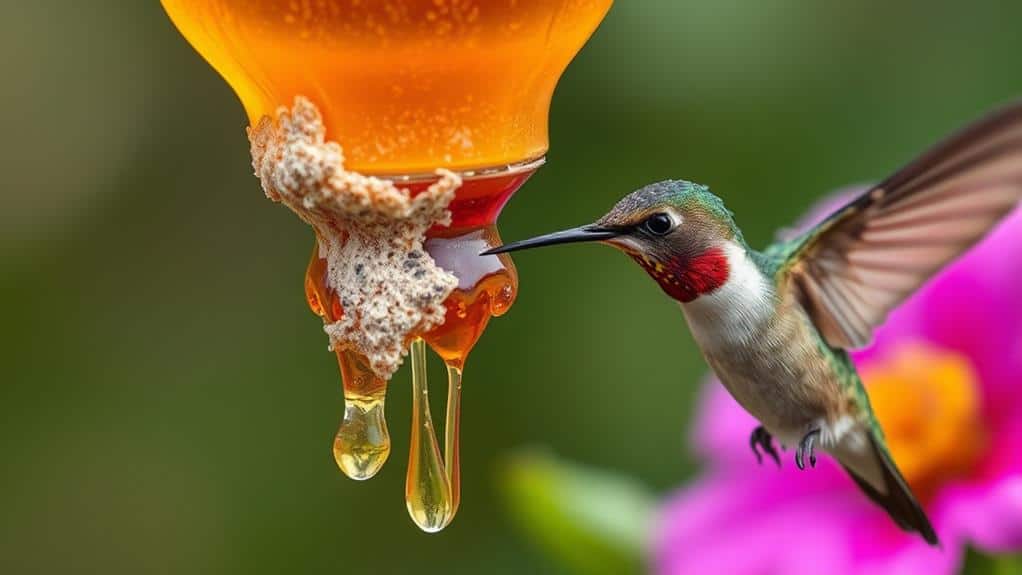
Fungal growth hazards make honey a dangerous choice for hummingbird feeders. Honey can harbor harmful fungi, like the deadly pathogen *Aspergillus*. When hummingbirds ingest nectar contaminated with mold, they risk fatal respiratory infections.
Unlike sugar water, honey's natural moisture content and composition make it more prone to fungal growth. This means even tiny amounts of moldy honey can be extremely harmful, possibly leading to death for the birds.
Additionally, while sugar water can be easily monitored for freshness and cleanliness, honey spoils quicker and fosters fungal growth.
Natural Antibiotics Concerns
While fungal growth is a significant hazard with using honey in hummingbird feeders, concerns about natural antibiotics in honey also can't be ignored.
Honey can contain harmful bacteria and fungi that pose serious health risks to hummingbirds, potentially leading to fatal infections. Even though honey has natural antibiotics, they don't outweigh these dangers.
Hummingbirds need a high-energy diet, and honey's composition doesn't provide the essential nutrients they require. The risk of bacterial contamination is a critical concern. It can make hummingbirds sick and disrupt their natural feeding behaviors.
Experts and veterinarians strongly advise against using honey in feeders because it can cause serious health issues. Let's keep our feathered friends safe by making informed choices!
Safe Nectar Alternatives
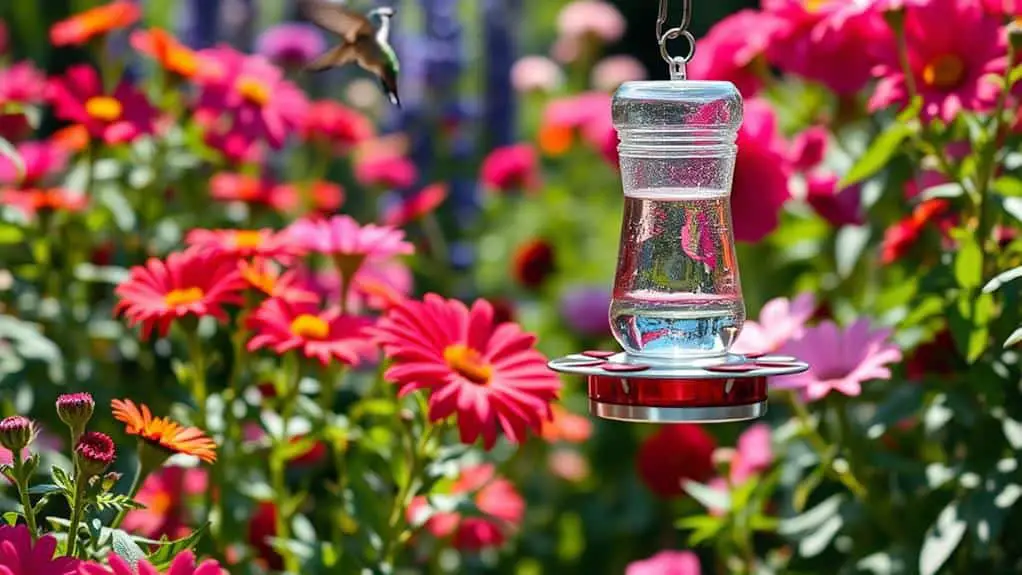
One of the best ways to guarantee hummingbirds stay healthy is by providing them with a safe nectar alternative. The ideal choice is homemade sugar water. This mix is easy to prepare and closely mimics the natural nectar they love.
Here are three essential tips:
- Use refined white sugar: Raw or unprocessed sugars can contain impurities that are harmful to hummingbirds.
- Avoid store-bought red nectar mixes: These often have harmful additives and preservatives.
- Change the nectar regularly: Refresh the sugar water every 4-5 days to prevent mold growth.
Proper Nectar Preparation
Making nectar for hummingbirds is simple and safe if you follow the right steps.
Use a mixture of 1 part sugar to 4 parts water, and make sure to boil the water for a couple of minutes before dissolving the sugar.
Ideal Sugar-to-Water Ratio
Creating the perfect nectar for hummingbirds means getting the sugar-to-water ratio just right. The ideal ratio is 1 part sugar to 4 parts water. This balance provides the necessary energy for their high metabolism.
To make the sugar solution, dissolve 1/4 cup of sugar in 1 cup of water. Stir until fully mixed; no need to boil unless you're making larger batches. Here's a quick guide:
- Measure: Use 1/4 cup of sugar and 1 cup of water.
- Mix: Stir until the sugar dissolves completely.
- Maintain: Change the nectar every 4-5 days to keep it fresh.
Avoid using honey or corn syrup as they can harm the hummingbirds. Stick to this simple method and you'll have happy, healthy visitors!
Risks of Honey
Honey's allure for its natural sweetness might tempt you to use it in your hummingbird feeders, but doing so can pose serious risks.
Honey can harbor harmful bacteria and fungi, leading to fatal infections in hummingbirds. Even though honey has natural antibiotics, they don't eliminate these dangers. Hummingbirds need a high-energy diet from nectar, and honey doesn't provide the right nutritional balance like a simple sugar-water mixture does.
Additionally, honey can disrupt their natural feeding behaviors because they're not adapted to process it, which can harm their health and survival.
Instead, stick to a safe and effective mixture of granulated sugar and water. This mimics the natural nectar that hummingbirds thrive on.
Storing Prepared Nectar
While honey poses significant risks to hummingbirds, it's equally important to focus on how we prepare and store their nectar.
Proper nectar preparation guarantees our tiny friends stay healthy. Here's what you need to know:
- Nectar Recipe: Mix 1 part sugar with 4 parts water. No need to boil unless making larger batches. Boiling can help dissolve sugar faster but isn't necessary for small amounts.
- Storing Prepared Nectar: Store any unused nectar in a clean, airtight container in the refrigerator. It stays fresh for up to two weeks.
- Monitor for Spoilage: Always check stored nectar for mold or spoilage. If you see any signs, discard it immediately.
Expert Guidelines
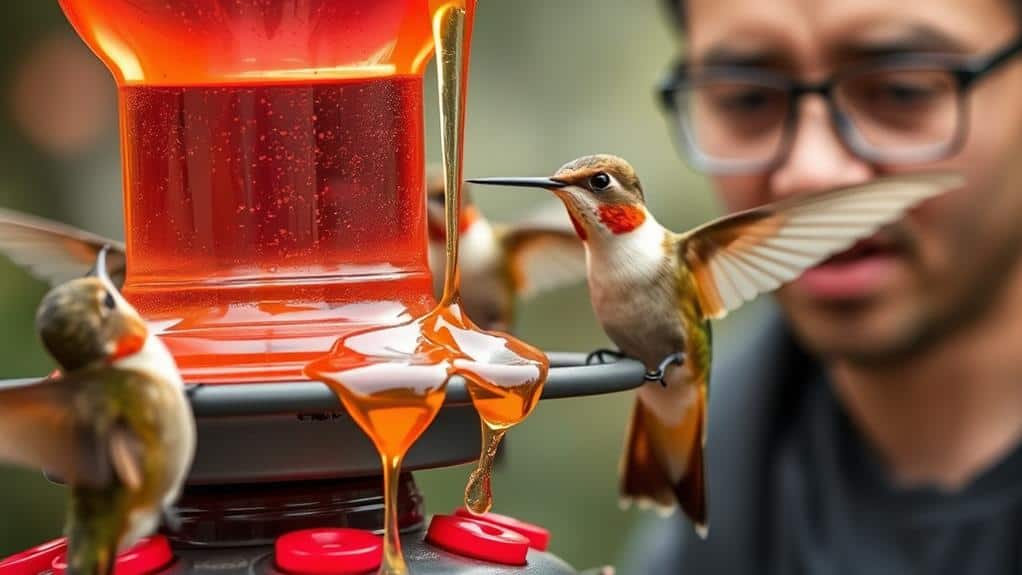
According to leading veterinarians and avian specialists, using honey in hummingbird feeders is strongly discouraged due to its severe health risks.
Honey can harbor harmful bacteria and fungi that can cause fatal infections in hummingbirds. Experts recommend sticking to sugar water, which is safer and meets the birds' high-energy needs.
Hummingbirds thrive on nectar, and sugar water provides the necessary carbohydrates without the dangers associated with honey. Despite honey's natural antibiotics, it doesn't offset the risk of bacterial contamination.
Additionally, feeding honey can disrupt their natural feeding behaviors, as they're adapted to consume nectar from flowers. By using sugar water, we can guarantee we're providing the best care for these delicate creatures.
Maintaining Feeder Hygiene
Guaranteeing proper feeder hygiene is essential for the health and well-being of hummingbirds. Here's how you can make it part of your routine:
- Clean Regularly: Clean your hummingbird feeders every 4-5 days. This prevents mold and spoilage, keeping the nectar safe.
- Use Hot Water: Rinse feeders with hot water. Avoid soap unless absolutely necessary, as residues can harm hummingbirds.
- Inspect Nectar: Always check the nectar before refilling. If you see any signs of spoilage or mold, discard it immediately.
Remember to store unused nectar in the fridge for no longer than two weeks and use small, easy-to-clean feeders.
Following these steps will help guarantee your hummingbirds have a healthy feeding environment. Happy bird-watching!
Hummingbird Health Monitoring
Hummingbird health monitoring is essential for ensuring that these delicate creatures thrive in your garden.
First, regularly inspect your feeders for mold, spoilage, or leaks, as these can harm the birds. Keep a close eye on nectar levels, refilling every 4-5 days in cooler weather and at least twice a week when it's hot.
Watch the hummingbirds for any signs of illness, like lethargy or trouble feeding, and report any sick birds to wildlife rehab centers.
Also, check for unwanted visitors like bees and wasps, which can stress the hummingbirds.
Promoting Safe Feeding Practices
To keep hummingbirds safe and healthy, it's important to prevent fungal contamination in their feeders and guarantee they get the right nutrients.
By using a simple sugar-water solution, you can provide them with the energy they need without the risks honey poses.
Let's commit to educating others about these safe feeding practices, so we can all enjoy watching these amazing birds thrive.
Preventing Fungal Contamination
When it comes to keeping our feathered friends safe, ditching honey in hummingbird feeders is a must to prevent fungal contamination. Honey can harbor harmful fungi, like Aspergillus, which can cause fatal infections in hummingbirds.
The high sugar concentration in honey creates an ideal environment for fungal growth, especially in warm weather. Unlike granulated sugar, honey doesn't dilute properly, increasing the risk of microbial contamination.
To promote safe feeding practices, follow these steps:
- Use a sugar-water solution: Mix one part sugar with four parts water.
- Clean feeders regularly: Wash with hot water every few days.
- Monitor for mold: Check feeders frequently to guarantee they're mold-free.
Ensuring Bird Health
Guaranteeing the health of our beloved hummingbirds often requires proactive and mindful feeding practices. When we use honey in hummingbird feeders, we might unknowingly introduce harmful bacteria and fungi. Their digestive systems can't handle honey, which can lead to fatal fungal infections.
Instead, we should mix granulated sugar with water to provide a high-energy diet that's safe and effective. Veterinarians and avian specialists strongly recommend sticking to sugar-based nectar.
It's also essential to regularly monitor and clean the feeders to prevent contamination. Keeping the feeders clean guarantees that our tiny feathered friends stay healthy and vibrant.
Frequently Asked Questions
Does Honey Cause Fungal Spores in Hummingbirds?
Yes, honey does cause a fungal risk for hummingbirds. I wouldn't use it because it can lead to aspergillosis, a deadly respiratory disease. Stick to sugar water to keep them safe and healthy.
Is Honey Water Better Than Sugar Water for Hummingbirds?
Honey water isn't better than sugar water for hummingbirds. Nutritional differences matter; honey lacks the high-energy content they need and poses health risks. Stick to the 1:4 sugar-to-water ratio for a safe, effective feeding solution.
Can You Put Honey in a Bird Feeder?
You shouldn't put honey in a bird feeder due to nutritional concerns. Honey can harm hummingbirds by promoting bacterial contamination and fungal growth. Stick to sugar water instead, as it's safer and aligns with their natural diet.
How Long Can Sugar Water Sit Out for Hummingbirds?
I change the sugar water in my hummingbird feeders every 4-5 days to maintain the right sugar concentration and prevent spoilage. In hot weather, I replace it twice a week to guarantee it's always fresh.
Conclusion
So, let's keep our hummingbird friends safe and healthy by never using honey in their feeders. Stick to a simple sugar-water mix and always clean your feeders regularly. You'll not only enjoy watching these amazing birds, but you'll also know you're providing the best care for them. It's easy to make a big difference with just a little effort. Happy gardening, and thank you for helping our hummingbirds thrive!

